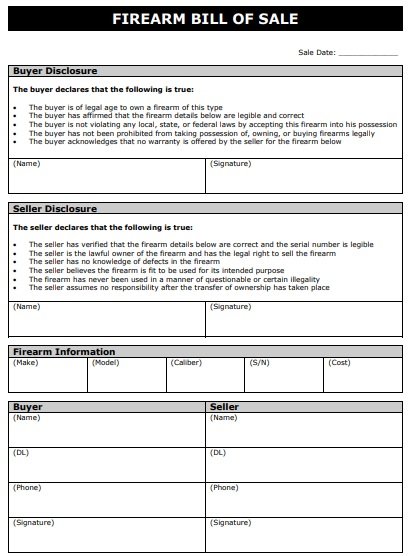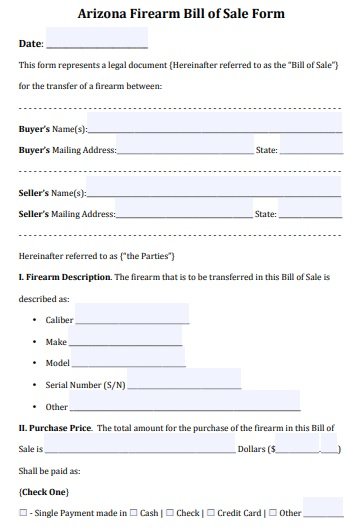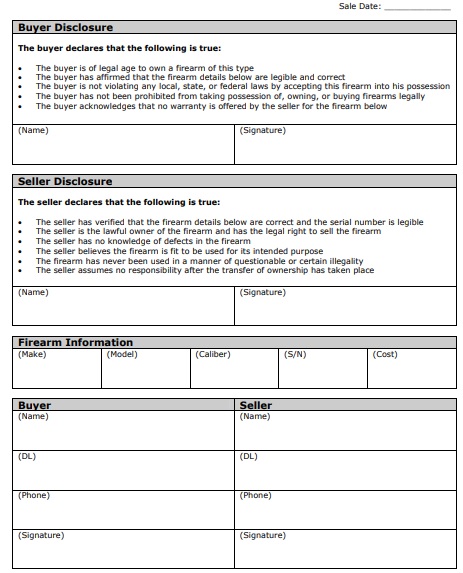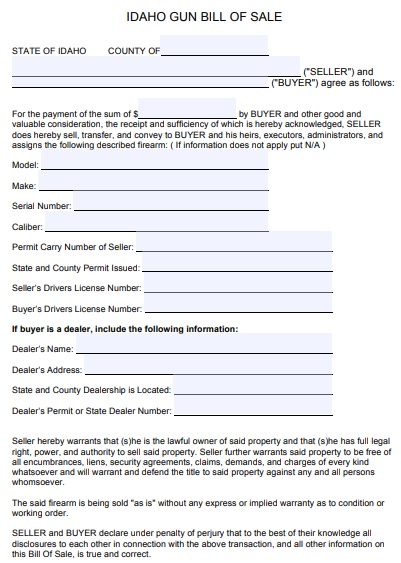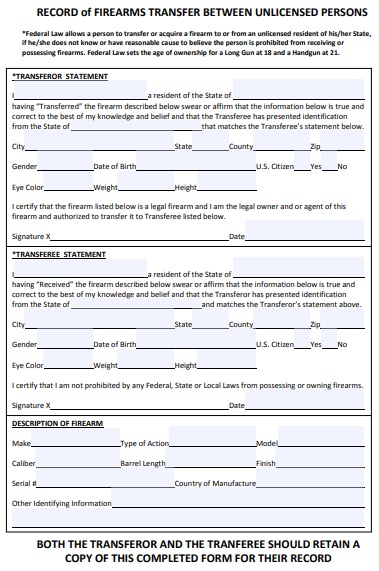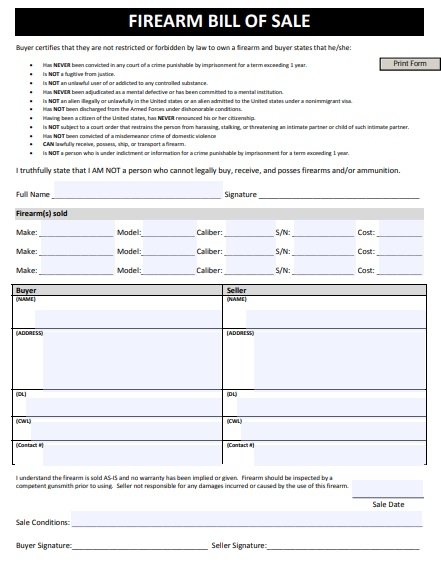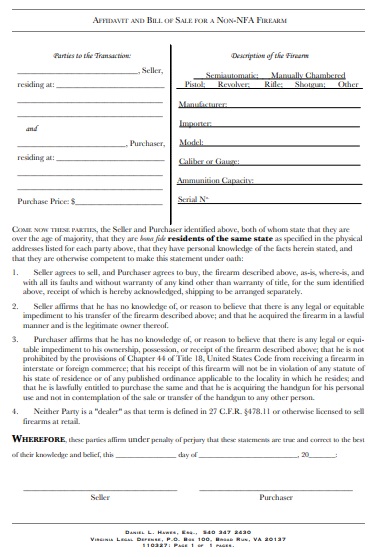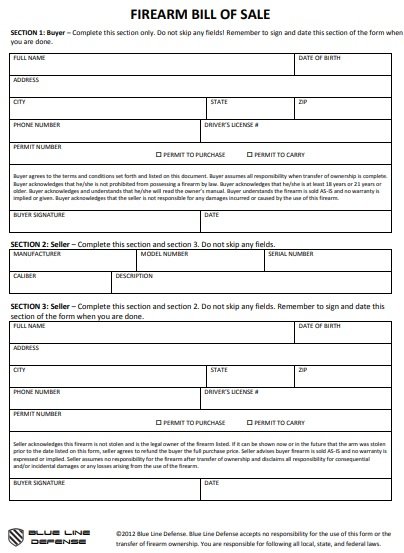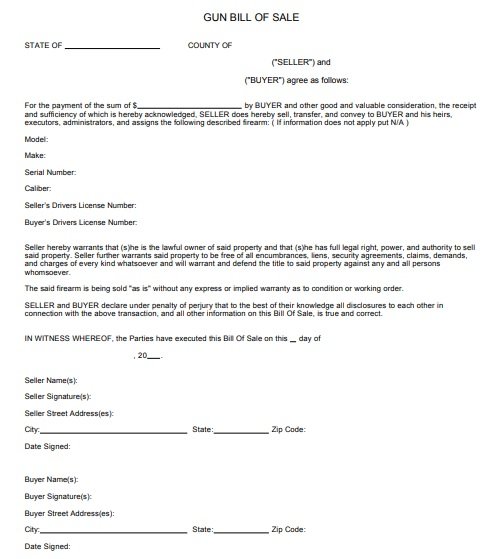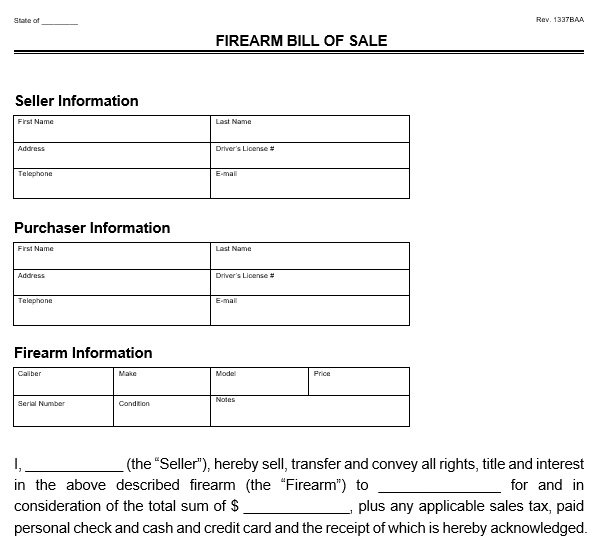A firearm bill of sale template is a document used to record the transfer of ownership a handgun, rifle, or shotgun. This document indicates that the seller agrees to transfer ownership of a firearm to the purchaser in exchange for a certain amount of money. It protects both the seller and the buyer from liability or fraud.
A firearm bill of sale provides written proof of the various conditions. It ensures that a transaction actually occurred. It means that the other party cannot claim theft or that they never received the gun. Moreover, it also makes sure that the firearm truly belonged to the seller and was not stolen. The bill of sale includes all essential details about the gun such as model, year, the document serial number, etc. It also specifies how the seller made promises.
Table of Contents
Selling a gun by using a firearm bill of sale:
Here are the steps for you to follow;
On private gun sales, check the state laws
You may not require a Firearm Bill of Sale to sell a gun but you can protect yourself from legal issues by identifying the local and state laws regarding private firearm sales. Private firearm sales to unlicensed people. But, in some states, they have specific restrictions while others don’t allow them at all. Contacting your local Alcohol, Tobacco, Firearms (ATF) office is the safest bet in case the law seems complex or unclear.
Perform a background check
For private gun sales, background check requirements may vary across states. It is essential to figure out whether you require to perform a background check via a licensed dealer or government agency before selling to the buyer.
Ask for a gun license
Ask the buyer whether they currently have a license to carry, a concealed carry permit, or other such documentation in order to limit the risk of selling to someone who shouldn’t have a gun. However, it isn’t a requirement, it just provides a certain level of security. Before purchasing or carrying a firearm, specific states require some sort of permit or license.
Arrange an in-person exchange
When you meet with the buyer face-to-face, it enables you to check their ID and verify whether they’re from the same state where the private gun sale has taken place. For a state background check, without sending the weapon to a licensed firearm dealer, you can’t send or sell a gun across state lines.
Complete a firearm bill of sale form
You and the buyer should fill out a Firearm Bill of Sale in order to protect yourself from future liabilities. This also finalizes the sale of the gun. The document must have your contact details so that legal authorities contact you when they need. Moreover, the document should be signed by both parties as it is an official record of a gun sale. Both you and the buyer have a copy of the completed Firearm Bill of Sale when the exchange has completed.
How to write a firearm bill of sale?
Here are the steps to write a firearm bill of sale;
The date:
At the top of the page, write the date that should be used to discuss this paperwork.
The parties:
- Buyer’s name: Print the gun buyer full name in this section.
- Buyer’s address: provide the legal address of the gun purchaser that is appeared on his or her State I.D. like a driver’s license.
- Seller’s name: mention the full name of the firearm dealer or seller. If the seller is a business entity then include the entity’s entire name including any applicable status suffix.
- Seller’s address: here, include the legal address or business address of the firearms seller.
Firearm details:
- Make: The manufacturer of the firearm being purchased must be displayed. It assists in identifying the concerned gun.
- Type/model: The firearm type or model should be decoded with a visual inspection or its manufacturer’s details.
- Caliber: The caliber, and the diameter of the gun should be reported in mm (millimeter).
- Serial number (SN): In many states, it is mandatory to mention the serial number of the firearm on the bill of sale. By including this information, it will be clearly identified the piece being sold to future reviewers of this paperwork. The serial number is basically found on a gun’s handle. However, it can be located on the slide or trigger guard. If the sold gun has been rebuilt and displays more than one serial number then make sure to note this part.
Purchasing details:
- Payment amount: the dollar amount the seller requires to transfer the ownership of the gun to the buyer should be included here. It is important to mention the full value or original asking price for the gun.
- Payment date: mention the date when the Firearms Buyer must submit payment to the Seller. It can be the same as this document date. In the checkbox, describes when the Firearms Buyer must pay for the gun being sold.
- Payment options: state how a sum of money is delivered whether by check, money order, credit card, cash, or wire transfer. It is always suggested to avoid cash. During transferring ownership of a firearm, establish as much of a paper trail as possible. In case, the ownership of the firearm will transfer as a gift then use this document to generate such a fact by choosing the appropriate checkbox statement. You should also check Motorcycle Bill of Sale Form.
No warranty:
- Buyer’s signature: the buyer who will assume ownership of the firearm must sign this bill to prove his or her participation in this transaction.
- Buyer’s Signature, printed name, and the date
- Buyer’s driver’s license and issuing state
- Seller’s signature and printed name
- Seller’s driver’s license and issuing state
Is firearm bill of sale a legal requirement?
In some states, a firearm bill of sale isn’t a legal requirement but it is an important document to have. This document is highly useful if are buying or selling a privately-owned gun. This document acts as proof of the transfer. The information mentioned in it indicates that whether you are the rightful owner of the gun or you’re not liable for the firearm anymore. You have to perform other actions in some states to trade or sell a firearm privately.
Conclusion
In conclusion, a firearm bill of sale template is a document that serves as evidence for the transfer of ownership. It keeps track of the purchase and ownership transfer of a gun.
Faqs (Frequently Asked Questions)
No, it doesn’t need notarization. However, the requirement of bill of sale notarization may vary from state to state. Regardless of your state laws, it is a good idea to notarize the bill of sale. An extra level of legal protection can be added by notarization.

